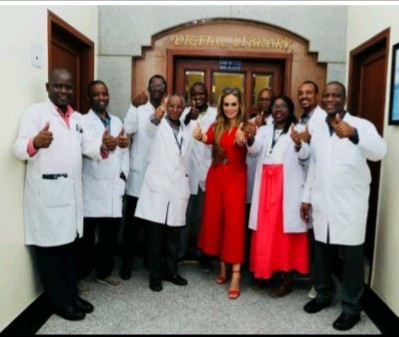by gfhnews.comMay 1, 2021 in Health 00SHARES19VIEWSShare on FacebookShare on Twitter
By Ebere Agozie
Dr Rasha Kelej, the President of Merck Foundation `More Than a Mother’ says campaigning will contribute to the development of the healthcare sector and raise awareness about Health and Social issues surrounding infertility stigmatisation.
Kelej said this during the online video conference of Merck Foundation Community Awareness Program and 2021 Health Media Training.
She said the foundation’s interventions will break the stigma around infertility in general and infertile women in particular, and as well support the girl child.
“Through this campaign in 35 African countries, we have provided 180 doctors with Fertility specialists and embryology training programmes to tackle infertility.

“Also another 155 doctors with one-year diploma and two-year master degree of sexual and reproductive health from a UK university which will improve reproductive health, and women health in general.
“It provides the necessary training to establish a strong platform of experts in many important and critical specialties in their countries.
“The campaign that was inaugurated in Africa in 2015 in partnership with the continent’s First ladies as ambassadors is a call to action to break the stigma around infertile women, empower them and to build fertility care capacity in their countries’’.
Dr Edem Hiadzi, Consultant Obstetrician/Gynaecologist/Fertility Specialist, Lister Hospital and Fertility Centre, Accra, Ghana while discussing `Infertility Prevention’ said that the search for infertility solution should be the responsibility of both spouses.
Hiadzi, who is also the President, Fertility Society of Ghana (FERSOG) said that causes of infertility in male factor is 40 per cent, female factor 40 per cent, male and female factor combined, 15 per cent while about five per cent is unexplainable.

“Infertility affects Men and Women equally, it does not just affect women only and about half of the causes of infertility are due to both male and female factors.
“It is one of the commonest conditions affecting reproduction in the age group between 20 and 45 years so the men should support their wives and get tested with their wives,’’ she advised.
She regretted that only few women in developing countries obtain care from trained personnel, while the majority still rely on traditional birth attendants or churches where non-sterile delivery procedures are practiced.
Mr Samuel Lukhanda, President of Zambian Union of Journalists while talking on the importance of the media in breaking infertility stigmatisation said the media can foster change in the society and partner in social dialogue.
He said that people who are infertile experience a strong need of guidance and social support, a need that is not always met by existing structures of support.
“Stigma is an overarching term including problems of knowledge (ignorance or misinformation), attitudes (prejudice), and behaviour (discrimination) that affect individuals who belong to a certain group or are affected by certain conditions.
“Research points out that infertile individuals experience shortcomings in fertility care, social support, healthcare, and many fail to recognise the grief caused by infertility.
“This is the gap the media need to fill by highlighting these gaps and exposing the stereotype that has continued to haunt individuals, especially women in Africa’’.
Lukhanda noted that in Africa, women have been disproportionately affected by the infertility stigma because of the traditions and cultural customs concerning childbearing.
“This may lead to increased feelings of shame and isolation and the persons may hide their feelings.
“The media should find others who are going through similar experiences and give them space in order to help the affected person realise that she/he is not alone and that their feelings are reasonable,’’ he advised.
